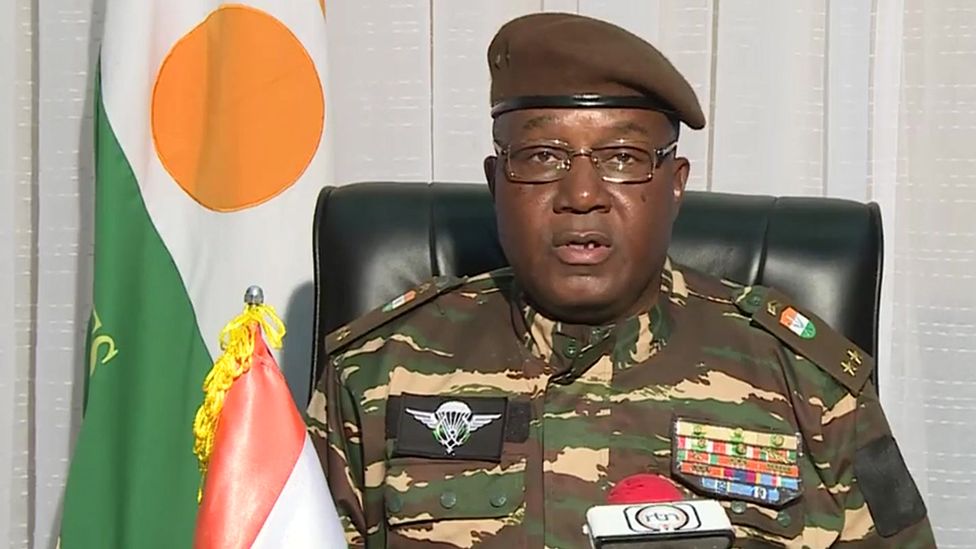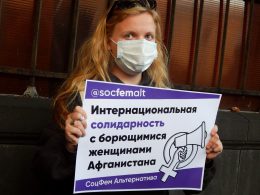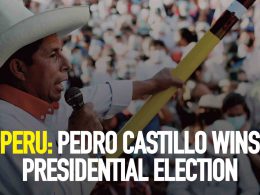By Aj. Dagga Tolar, Movement for a Socialist Alternative (our sister organisation in Nigeria)
We say:
*No to war or any military invasion of Niger.
*No Nigerian soldier needs to go die to defend a bourgeois democracy that impoverishes and oppresses the working masses in Niger.
*No to sanction against the working masses of Niger.
*For the unity of the working masses & rank-and-file of the military and police to act together against Capitalism & Imperialism.
*For Solidarity with Workers in Niger and Sahel region Opposing Capitalism & Imperialism.
Insecurity has been the main excuse put forward by the putschists in the whole of the Sahel, including Mali, Burkina Faso, Guinea and now in Niger. ECOWAS, through its current head Bola Tinubu, president of Nigeria, issued a one-week ultimatum for the junta headed by Abdourahamane Tchiani to hand over power back to the ousted leader still under house arrest in the presidential villa. The one-week deadline is gone. The question of a military invasion of Niger to restore bourgeois democracy has become the order of the day, with Tinubu forwarding a letter to the Senate seeking approval for the Nigerian military to go to war. Even with the military regimes in Guinea, Mali and Burkina Faso issuing statements to the fact that any invasion of Niger on the above account is a declaration of war against them as well, they will not watch events hands Akimbo.
We are, therefore, likely faced with the possibility of war in the Sahel, which in all terms will also turn out a proxy war both for French imperialism and its Western allies backing Nigeria and other ECOWAS allied forces on one side and against Niger, with Mali, Burkina Faso, Guinea and the Wagner mercenary group, and possible also China on the other side. All of these forces represent their own imperialist ends. This could inevitably set up the Sahel region as a new front in the New Cold War already seen raging on for one and half years in Ukraine.
The MSA categorically opposes the war in Niger and calls on the workers and the trade unions in Nigeria to commence a campaign of opposing the Tinubu regime, sending Nigerian troops to Niger. This very call must be extended to all of the ECOWAS countries, with workers not only stating their opposition to any military invasion of Niger but as well as organising themselves to fully take their destiny into their own hands by coming into the arena of struggle, and providing leadership for the whole of the working masses inclusive of the rank and file of the military and the police in a struggle against capitalism and imperialism.
Why this new wave of coup d’état in Africa?
The coup plotters themselves have zeroed in on the question of insecurity, and “bad governance” on the part of the overthrown civilian rulers, who live a luxurious life in a world of complete affluence, distinct and different from that of the people they governed, who are condemned to live in penury and abject poverty.
A majority of these discontented younger officers, in carrying their coups, blamed the state of insecurity on the overthrown rulers for not providing the necessary wherewithal and weapons with which to effectively prosecute and combat the growing state of insecurity fueled by Jihadists insurgency in the form of various Islamic militant groups with links and support from Al-Qaeda and ISIS in the Middle-east, not excluding Boko Haram in Northern Nigeria as well. In so doing, the coupists in the Sahel region are merely reducing the question of Islamic insurgency to just a military question. But the efforts of these new rulers in Mali, Burkina Faso and Guinea, even with the support of the Wagner mercenary group, have not, to date, declared a complete victory of them.
It will also be completely wrong to locate it within the fervent for a new messianic desire to espouse and extend the frontiers of Islam by the various Islamic Jihadist groups. At the heart of it is the question of poverty that a majority of the people in Africa are condemned into. And as well as the failure of the ruling elites since flag independence to develop the means of production with which to cater for the needs of the working masses and youths on the African continent.
Flag independence has done nothing whatsoever to reorder the established colonial arrangement that initially condemned Africa to the lowest rung of the capitalist world order as a haven of producing raw material for the industrial West, inclusive of China now, no more, no less. A situation which denies Africa the opportunity to take control of its wealth and resources and employ the same to meet the needs and aspirations of Africans themselves. It follows, therefore, that without taking on capitalism and imperialism, a system that allows for the private domination of the wealth of society by a few, both locally and internationally, Africa will continue to crawl, moving from one crisis to the other despite its enormous wealth and resources.
The Anti-French Sentiment & Turn to Russia Not Anti-Imperialism
This new wave of successful coups has also been heralded by a growing anti-France sentiment, with the new rulers evicting French troops from their territories. The 400 French Special Forces left Burkina Faso following a one-month notice in January 2023 to vacate. Last year, French troops under the Barkhane unit withdrew from Mali. In June, Col. Assimi Goita, the head of the Malian Junta, ordered the 12,000 peacekeeping troops in Mali to leave as well. French troops have also left the Central African Republic. On the heels of this withdrawal is a mass protest in these countries lashed with anti-French sentiments largely over their ineffectiveness in helping combat the insurgency. Side by side with is also pro-Russia sentiments. But attention is now on Niger, where 1,500 French troops are also located. Will the bug bite next in Niger, and after then, where next?
But this question will likely be determined by how French imperialism treats the Tchiani regime. French President Emmanuel Macron has already declared the coup as “Illegitimate” and warned that France “will not tolerate any attack on…its interest”. This interest is largely on the grounds of economics. Uranium, for example, provides over 75% of the foreign exchange earnings of Niger, which French companies largely dominate. To be the 7th highest Uranium producer in the world and yet one of the world’s poorest countries is a contradiction in itself. The picture is not any different from other African countries. Another example is Nigeria, though colonised by Britain and ranked 7th on the OPEC list of Crude oil production. Still, it lacks the ability to refine the small product for its local use. Importing fuel through shipload makes it one of the costliest in the world in comparison to other wage earners, with workers’ monthly minimum wage at 30, 000 Naira a month ($38 a month) and a litre for fuel selling for between N650 and N750 ($1) depending on the part of the country you are.
It is this huge anti-French sentiment that explains why France agrees to withdraw her troops from Mali andd Burkina Faso, where earlier coups occurred. Any military intervention will also not just be confronting the Tchiani-led junta in Niger but also the teeming population of the working masses on the streets in their millions in support of the coup, who will bring pressure to bear on the regime for the withdrawal of French troops .
A direct consequence, though, of the failure of the neo-colonial capitalist domination of the economy from one regime to another regime, even inclusive of previous military regimes as well. However, what is not very clear at this stage is the fact that the working masses, having known what they don’t want, yet do not fully know the only way forward and out of the crisis of governance plaguing the effort of nation-building in Africa is in the working masses consciously coming into the arena of struggle in their own name and class with the full support of the rank and file of the military and police in a united action to end the rule of capitalism and imperialism.
Marxists must be at the forefront in pointing out that this contradiction of huge abundant mineral resources that cannot be employed to meet the needs of the working masses is largely because it is extracted to enrich a few who front for big business locally and internationally. Added to the above is the dictate of both micro and macroeconomic policies by the IMF and World Bank, and other International Financial Institutions for the purpose of ensuring that the state plays no role whatsoever in taking control of the wealth of society.
And as long as this is the situation, the goal of constant and regular electricity supply and steel production, all key essentials for industrialisation and developing the means of production in the direction to meet the needs of the working masses as opposed to tending to the greed for profit by big business will not occur. This conscious act on the part of the IMF and World Bank aims to ensure that Western and Chinese imperialism are not rivalled and continue to be the only industrial base of the universe while Latin America and Africa continue to be the market for manufactured goods.
This is not the agenda of the coup plotters or the Tchiani junta in Niger, rather than a movement to reverse the trend and aim at mobilising the working masses on a path that seeks to take control of the resources by nationalising the commanding sector of the economy under the democratic control and management of the working people. The Junta leadership in Niger is rather being urged on by a mass protest with crowd flying Russian flags, an indication of preferring Russia to France in the same way as was witnessed earlier both in Mali and Burkina Faso. Captain Ibrahim Traore, the 34-year head of the Junta in Burkina Faso, stated at the recently held Russia-Africa summit hosted by Putin in St. Petersburg that “The region is shaken up by the desire for change… to turn our backs on traditional partners and to turn to our real friends, like Russia which has supported us through decolonisation until today.”
French losses in the Sahel region have turned out to be gains for Russia, with the new junta rulers increasingly turning to Wagner group led mercenary by Yevgeny Prigozhin. According to a news report by the BBC, the US alleged that the Wagner group is “contracted at a cost of $10 million per month” in Mali.
The above can only mean that the Wagner group and Russia are not engaged in any charity or philanthropic military venture. The Wagner group does not hide its mercenary credential as fighting particularly for no justifiable humane reason but for the sake of cash and the huge resources that can be earned intervening on behalf of itself and the Russian state in these rich reserves of abundant raw material. Capitalism dominates in Russia, but Russian imperialism at this stage is economically much weaker compared to Western imperialism, but militarily more adventurous. And the Wagner group serves as its auxiliary force playing an important and brutal role in Ukraine and Syria, has since 2017, enabled the Russian capital to get control of gold and diamond mines and other resources from the Central African Republic to Sudan. It is taking full advantage of one of the legacies of the Russian Revolution in opposing colonisation, which even the Stalinist regime in the former Soviet Union played upon then to support the decolonisation in Africa as a means of gaining spheres of influence for itself in the Cold War era. The same conclusion quickly be drawn in relation to China, which is now the second most powerful imperialist power globally, competing with the US for the number one spot. It is the largest bilateral creditor to Africa, using these loan facilities to establish an iron grip on mineral and land resources and to dominate local markets with its manufactured exports.
Why is Tinubu leading the onslaught for war in the Niger Republic?
It is clear that behind the bravado of the Tinubu regime is the real fear that the military in Nigeria can also be tempted to repeat the same phenomenon and boot it out of power. Indeed, if this were to happen, millions of Nigerians would likely come onto the streets to celebrate as has happened in other coup-afflicted countries in the Sahel region. Bourgeois democracy in Nigeria is currently enjoying the best of the run, 24 years on. Tinubu, addressing ECOWAS leaders, states, “We must stand firm on democracy… it is the best form of government.” But he is alone on this point. The working masses will differ a great deal from his conclusion and acquiescence to the view stated by Fela in one of his songs that it is more of a “demonstration of craze.”
It is this craziness that has dominated the Tinubu regime with his rabid madness to impose the same failed neoliberal policies of deregulation and privatisation on the working masses. On day one in power, fuel prices increased from N165 to N520 and less than a month after N617. Policy after policy by the Tinubu regime, from a loan scheme to students with conditions that students from working-class backgrounds can’t access. Yet with the scheme not yet even running, universities in the country are announcing a hike of about 150% in school fees.
We are therefore witnessing the domestic reign of policies moving over into the foreign sphere with the Tinubu regime desperate to prove himself a true faithful of international capital; what better means than championing the invasion of Niger to win himself into the heart of Western Imperialism and the same time turn out a good lackey of French imperialism.
This is one of the vital reasons why the working masses in Nigeria must be at the front run to oppose war and invasion of the Niger Republic, and as well canvass the same for other countries in the Sahel region and Africa at large. Indeed a war will impact the working masses in the Sahel region negatively, leaving the living condition worst off. For a region already bugged down by unending war with Islamic insurgency. The regular army with be further undermined and weakened and laying it open for some of these Islamic groups to even directly control the state as was done by the Taliban group in Afghanistan.
In opposing war, can we then provide any form of support for sanctions, which is the position those opposed to war are putting forward? The so-called “diplomatic approach”. Again the answer is no. On the orders of Tinubu, Nigeria, which provides electricity to the Niger Republic, has gone ahead to cut off the supply, and the borders closed. The working masses will be at the receiving end of sanctions like these. They are the ones who will again suffer and be made to pay for the failure of the identified “bad governance” and “insecurity”, from which they are already agonising when they are not the ones who carried the coup. The Tchiani junta has taken control of political power and will employ the same power generators even round the clock to provide electricity for themselves. Workers all over, therefore, must say no to such a manner of sanctions that worsen and add more pain to the working masses.
At the other end of the border in Nigeria, the seven states of Sokoto, Kebbi, Katsina Zamafara, Jigawa, Yobe, and Bornu will also be negatively impacted by sanctions and not any less also by war, as well as the other countries of Libya, Algeria, Chad, Benin, Burkina Faso, and Mali. Sanctions will deeply affect the exchange of goods and services from all ends and worsen the food crisis and hunger in an area reviling from desert encroachment and Islamic insurgency.
Neither coup d’etat nor war is the solution to the crisis in the Sahel region. Only the working masses can come to their own rescue.
Workers coming forward to oppose war and sanction should not be interpreted to mean support for the new military adventurers who, with only the question of time, will clearly demonstrate that they are not any different from those they have taken over from both in terms of policy direction and calling and craving for the endorsement of the Western imperialism for their takeover of power or as we are already seeing a cry for Russia and China to take the place of French and Western imperialism as the case may be. Or even support for a return of those overthrown or even for regimes that will still come.
The working masses all over are the only ones capable of rescuing the situation. The working class is the only class that can take on capitalism and imperialism with all of the chance to defeat it, as was accomplished by the Russian workers and poor peasants in 1917 under the leadership of the Bolsheviks headed by Lenin and Trotsky.
The MSA calls on the trade unions, in Nigeria the NLC and TUC headed by Joe Ajaero and Festus Osifo must lead a campaign opposing the war and invasion of Niger Republic as well as any manner of sanctions that will impact negatively on the working masses in Niger. The necessity for solidarity with the working masses of Niger, Mali, Burkina Faso, and Guinea rising up in protest to oppose the domination of France over their economy must also be applauded and welcomed. Still, at the same time, it must be made quite clear that the Wagner Group of Russia, or even China is not an alternative; the quest for new partners shouldn’t be to replace French imperialism with new ones enhancing what others have called a new scramble and partition of Africa for China and Russia to edge themselves into Africa to exploit as well the wealth and resources of the continent that was till now mainly dominated by the US and Western imperialism.
The working class though a minority in most of Neocolonial Africa, but it remains the only class on account of the role it can play, not only in the struggle against the ruling class on the continent but as well as in the role it can play in developing the means of production and bringing about a transformation of any one country in Africa. Nigeria, with its mighty strength both in population and resources, can become a centre for revolutionary struggle, given the huge potential of the working masses and the experience the working class have garnered in providing leadership for the struggle against the neoliberal policies of deregulation and privatisation.
However, we cannot dismiss the uprising in all of the countries that have experienced successful coups in the Sahel region and the anti-French sentiment as insignificant. But the point must be made that this new wave of coups is not new, even to all of the countries in reference. The best examples from the earlier periods include Sankara’s Burkina Faso and Rawlings’ first coming in 1981, for all the latter earlier revolutionary rhetoric executed three rulers on a single day. He ended up handing over Ghana as a guinea pig for the experiment of neoliberal pills of the IMF and World Bank. Sankara fared even better and continues to be a model of a leader that young change seekers still look forward to. But he ended up in an unmarked grave, having been shot dead by Campoare, who then commenced to reverse all of the gains of his rule in Burkina Faso. The point here is that there can be no transforming society on behalf of the working masses or be made spectators in any struggle against capitalism and imperialism; the working class must lead the struggle.
The task before the working masses, in the Sahel region, in Nigeria and indeed in the whole of Africa, is strongly come into the arena of struggle to make a revolution. A socialist revolution that will nationalise the commanding sectors of the economy under democratic control and management of the working masses would put in place a parliament of elected workers, poor peasants and rank and file members of the military and the police’s representatives that constitute workers’ government.












